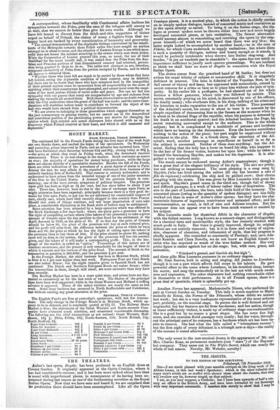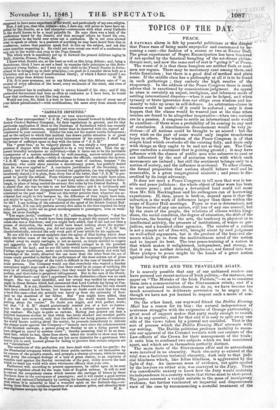THE JESUITS.
TO 'ME EDITOR OF TILE SPECTATOR.
Edinburgh, 7th November 1848. Sin—I am much pleased with your sensible critique on the lying work of the Abbate Leone, in this last week's Spectator; which is the more valuable that many men's minds are so stuffed with absurd ideas about the Jesuits, that they will swallow any lie, however stupid, on that subject. I am, as you may suppose, a Catholic; but I have been upwards of half a cen- tury an officer in the British Army, and have been intrusted by my Sovereign with very important commands. I mention this merely to show that I may be
supposed to have some experience of file world, and particularly of my own religion. Now, I tell you, that this Abbate—who, I dare say, will prove to have been ex- pelled by the Jesuits, as a bad character—commences with what every Catholic in the world knows to be a most palpable lie. He says there was a book of the confessions heard by the Jesuits, and that amongst others he found his own. No confessor in the world ever wrote out a confession. He is not even allowed ever to speak or allude to a penitent of anything he may have heard from him in confessor, unless that penitent speak first to him on the subject, and ask him some question respecting it. He could not even reveal one word of a confession to any one in the world—not even to the Pope himself.
The whole work is manifestly got up to forward the present delirium raging in Italy, Austria, France, Prussia, &c. I know what Jesuits are, at the least as well as this lying Abbate; and, being a Scotchman, think I have as cool a head to examine their principles as this Revo- lutionary young Italian: and I sent my only child to the French Jesuits in Switz- erland to be brought up in their principles,—so good do I consider them both as a Christian and as a lover of constitutional liberty; of which I flatter myself I am a better judge than Abbate Leone. G. M. P.S. It is pure nonsense, not to say falsehood, what this Abbate says of " an avowal of every affection of the heart, every sentiment of the mind, and even of one's dreams."
The penitent has in confession only to accuse himself of his sins; and if this pretended denunciator had been as often at confession as I have been, he would know that confessors do not like long stories. Would not you, Sir, think it a bore to have to listen to the sins of every one of your fellow parishioners?—with modifications, the same story from almost every one.



























 Previous page
Previous page